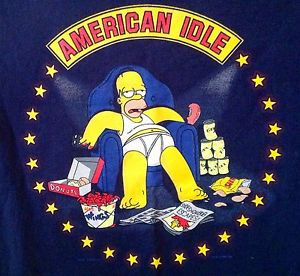 The Simpsons will always hold a special place in my heart, not only because it has been around ever since I was a child (making me feel as though I have grown older with the family), but also because it was one of the only shows my parents allowed me to watch on a fairly regular basis. They believed that even though at times it sent out poor messages, it was one of the better cartoon shows that was out there. Therefore, when I saw that I was being asked to watch an episode for class, I could not pass on the opportunity.
The Simpsons will always hold a special place in my heart, not only because it has been around ever since I was a child (making me feel as though I have grown older with the family), but also because it was one of the only shows my parents allowed me to watch on a fairly regular basis. They believed that even though at times it sent out poor messages, it was one of the better cartoon shows that was out there. Therefore, when I saw that I was being asked to watch an episode for class, I could not pass on the opportunity.
Before diving into the exact episode I chose to look at, and about whether or not cartoons (as a genre) can contribute to knowledge about contemporary culture, I feel it is important to simple state what cartoons are; cartoons are Popular Culture. With that said I would also like to point out that I have touched on this subject in my earlier blog, What is Popular Culture? and even a bit in Shakespeare: Past and Present. Very briefly what I said in those blogs was that I believe that popular culture plays an important role society as it is a reflection of what the society as a whole feels is important. Even if it is sometimes considered “low-brow” (Shakespeare having been once thought of as such), there is much that can be learned from examining this form of media.
Moving on from the abstract. The episode I chose to watch is called Waiting for Duffman, episode 17 from season 26. Right away the episode takes a critical look one of the newest crazes that has hit the streets, that of course being critical mass/bike parties.  https://www.youtube.com/watch?v=vWektEMGBGE The episode then moves quickly on to an over-the-top portrayal of the role beer plays in society, blatantly setting up society gender norms, and even goes as far as to show how trauma can negatively affect children. In my opinion, it magnifies almost every aspect of society (be it positive or negative), and makes it accessible for the general public to consume. In this way by watching just a single episode a person can get a glimpse of what the United States could be like if we were to take everything to the extreme.
https://www.youtube.com/watch?v=vWektEMGBGE The episode then moves quickly on to an over-the-top portrayal of the role beer plays in society, blatantly setting up society gender norms, and even goes as far as to show how trauma can negatively affect children. In my opinion, it magnifies almost every aspect of society (be it positive or negative), and makes it accessible for the general public to consume. In this way by watching just a single episode a person can get a glimpse of what the United States could be like if we were to take everything to the extreme.
With all of these references to current events, politics, and social justice, the one thing that keep me from fully embracing the idea that The Simpsons are educational is that many of the quips at society are made in a very subtle way. I know that I have often re-watched TV shows that I would see as a child and would be shocked at all of the references that simply went over my head because I was not informed. It is because of this that I feel, although these types of cartoons can be educational in the sense that they highlight what our society feels is important and where our values lie, the education can easily go right past someone who is not already (at least a little bit) social aware.

I liked reading your post. The Simpsons got away doing so many things when they started i think primarily because they were one of the few popular cartoons on network TV. It’s amazing how like you said it is easy for things in episodes to go over your head when lots of kids watch the Simpsons.
LikeLike